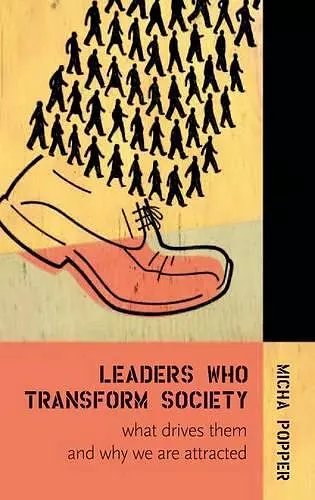Leaders Who Transform Society:
What Drives Them and Why We are Attracted
Format:Hardback
Publisher:Bloomsbury Publishing PLC
Published:30th Oct '05
Currently unavailable, and unfortunately no date known when it will be back

An intriguing psychological exploration of the emotional relationship between historically significant leaders and their followers.
In this wide-ranging historical exploration of transformational leadership, Popper examines why followers are influenced by leaders and what psychological dynamics exist between leaders and their subordinates, and, in the process, redefines the phenomenon of leadership.
In this wide-ranging historical exploration of transformational leadership, Popper examines why followers are influenced by leaders and what psychological dynamics exist between leaders and their subordinates, and, in the process, redefines the phenomenon of leadership. Exploring the emotional connections that bind charismatic leaders and those who support them, he contends that this multifaceted relationship is based on reciprocal need. By focusing on prominent figures throughout history who have altered the lives of their followers in profound ways, Popper shows how these leaders reinvented and disseminated value systems, for good (e.g., Nelson Mandela), but often for ill (e.g., Hitler). Whether the influence of a charismatic leader is destructive and negative or constructive and positively transformative, this intriguing work argues that the reciprocal process that takes place between leader and follower, as well as key formative events in the lives of leaders, are surprisingly similar.
Using such famous and infamous leaders as Mahatma Gandhi, Nelson Madela, Franklin Delano Roosevelt, Hitler, Charles Manson, and Jim Jones, Popper defines and explores three types of leader-follower relationships: Regressive relationships, which are characterized by mutual dependence; Symbolic relationships, which are rooted in symbolic meaning; Developmental-transformational relationships, which permit positive moral and emotional development.
"[T]he present title looks at constructive leaders (e.g., Franklin D. Roosevelt, Mahatma Gandhi, Nelson Mandela, and David Ben-Gurion) as well destructive ones (e.g., Charles Manson, Jim Jones, Adolf Hitler) and examines the psychological forces that produce such leaders and their followers. Popper proposes a relational model to describe leaders who transform society, a relationship based on the mutual needs of leaders and followers. These mutual needs can be based on regressive relationships (in which leaders and followers regress to a narcissistic/dependent father/child behavior--the Manson model), developmental relationships (in which leaders act to empower and rear their followers--FDR), and symbolic relationships (in which the leader becomes an emotional symbol for the followers, as in the case of Mandela). This interesting book will serve a variety of disciplines. Recommended. Upper-division undergraduates through faculty." - Choice
"Popper examines the leadership practices of everyone from Mahatma Gandhi, Nelson Mandela, Franklin Delano Roosevelt, Charles Manson and Jim Jones to determine how they developed relationships with those they led, including the regressive, or those in which all parties are mutually dependent, the symbolic, and those which are transformational and developmental and foster positive moral and emotional growth. He defines leadership as an expression of the circumstances and as a subjective creation of the followers, analyzes the main perspectives on leadership as a relationship, examines how transformational leadership applies in everyday life, and describes the development of transformational leaders in terms of motivation, ability, and developmental processes." - Reference & Research Book News
ISBN: 9780275985615
Dimensions: unknown
Weight: unknown
164 pages